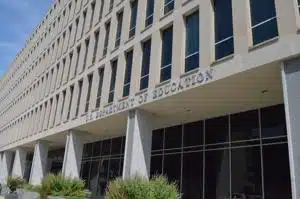(The Center Square) – Through more than 140 executive orders, President Donald Trump in his first 100-plus days in office has used his signing pen like a battering ram to undo sometimes decades-old policies and practices that have shaped the federal government, including in public and higher education.
On day one, the administration banned diversity, equity and inclusion programs from federal agencies and institutions receiving federal funding, targeting schools like Harvard University that refuse to comply with his policies. But Trump also is attempting to move schools away from such practices by requiring them to hire for “viewpoint” or “intellectual” diversity – a move that has been met with varying degrees of skepticism and support.
The administration included such terms in both its list of demands to Harvard and in an executive order on reforming accreditation in higher education.
Among the 10 demands outlined in a letter from the administration to Harvard in April, it directed the university to facilitate an audit of the “student body, faculty, staff and leadership” for “viewpoint diversity” and to submit that audit to the federal government.
“Each department, field, or teaching unit must be individually viewpoint diverse,” the letter reads.
The university is to hire or admit for viewpoint diversity until a “critical mass” is reached in each arena.
Within a handful of recent executive orders on education was one meant to hold accreditors accountable for “unlawful discrimination in accreditation-related activity under the guise of ‘diversity, equity, and inclusion’ initiatives.”
“A group of higher education accreditors are the gatekeepers that decide which colleges and universities American students can spend the more than $100 billion in Federal student loans and Pell Grants dispersed each year,” the order reads.
The order accuses accreditors of prioritizing “discriminatory ideology” in accreditation standards over strong graduation rates, return on investment and other important criteria. As an antidote, the order commissions the secretary of education with devising new accreditation standards, including one that requires institutions to “prioritize intellectual diversity among faculty in order to advance academic freedom, intellectual inquiry, and student learning.”
Heather Mac Donald, a scholar at The Manhattan Institute who’s written on a number of topics over the years, including higher education, is supportive of the goal but thinks the means are “problematic.” Mac Donald authored “The Diversity Delusion: How Race and Gender Pandering Corrupt the University and Undermine Our Culture” in 2018.
“I agree with the substantive critique entirely. I think universities are the enemy of Western civilization,” Mac Donald told The Center Square. “They are perpetuating an ideology of hatred and of ignorance. They are betraying their fundamental obligation, which is the pursuit of truth, by embracing a one-sided, ignorant understanding of the West’s contributions and its relative position regarding other civilizations.”
In addition, Mac Donald believes universities have discriminated against certain racial groups for years.
“The universities have been blatantly discriminating against whites, white males, Asians, Asian males. They’ve introduced grotesque double standards for admissions and hiring,” she said.
Despite her numerous and serious critiques of contemporary American universities, she thinks a mandate from the federal government for intellectual diversity represents bureaucratic overreach. The administration’s demands to Harvard were provided mostly on the basis that the university has violated discrimination laws through expressions of and responses to anti-semitism on campus, she said.
“We are a government of limited powers. It’s true that the government does oversee civil rights violations under Title VI, but it’s a stretch to say that what’s going on with the left-wing bias in academia constitutes a civil rights violation that the Trump administration has the authority to correct by withholding funds,” she said.
“As necessary as it is to make a course correction, I don’t think that we should be doing so in a way that will justify further left-wing incursions,” she added.
The Foundation for Individual Rights and Expression has also been critical of how the administration has gone after Harvard, saying it has flouted the lawful procedure for resolving such issues, despite also being critical of Harvard at times. But Tyler Coward, the foundation’s lead counsel on government affairs, isn’t as quick to oppose the administration’s mandate in the executive order on accreditation.
“We’re still thinking of what it looks like in practice for accreditors to have some sort of mandate for institutions to show ideological diversity. We at FIRE think that ideological diversity is a good thing. In its best form, it helps foster a true learning environment, a true marketplace of ideas that we expect our universities to be,” Coward told The Center Square.
While the executive order may appear heavy-handed, Coward said the government’s relationship with accrediting institutions has already occupied a kind of gray space for a long time.
“The government is the one empowering these accreditors in the first place. The reason these accreditors exist is because the government licenses them to exist. So it’s this weird thing where the government is involved sort of but not really, and so what is the appropriate response from the government if things aren’t going well. These are age-old tensions,” Coward said.
Scott Yenor, a scholar with California-based think tank The Claremont Institute, thinks, like Mac Donald, that American universities have strayed far from their original purpose and need correcting.
“This is a classical liberal solution with kind of non-classical liberal means,” Yenor told The Center Square.
Yenor agrees that universities need to be a marketplace of ideas but believes most no longer are, and he thinks the administration’s attempt at requiring it might be a step in the right direction.
“I don’t know that there’s any other way of actually achieving intellectual diversity besides a demand that you achieve it,” Yenor said. “The government has been doing that when it comes to racial diversity, and always with the justification that increasing racial diversity will actually increase the intellectual diversity on campus.”
“What the Trump administration is doing is what has been done for a long time already, which is making explicit demands for ideological diversity but more direct than the indirect way it’s been done on racial stuff.”



















































